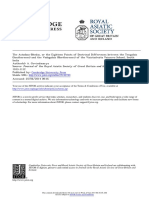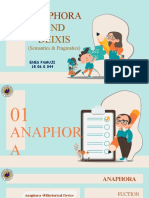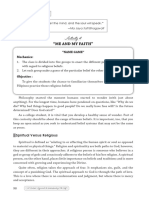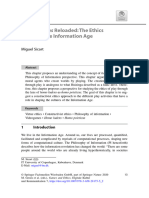0 ratings0% found this document useful (0 votes)
134 viewsTanabata Festival
Tanabata Festival
Uploaded by
ครอบครัว ตัวชาThe Tanabata Festival is celebrated in Japan during the first week of July. It originated in China as the Qixi Festival and was introduced to Japan by Empress Koken in 755. The festival commemorates the story of Orihime and Hikoboshi, two lovers who are separated by the Milky Way and allowed to reunite only once a year on the seventh night of the seventh month. While the specific dates vary by region, the highlight is celebrating the reunited lovers on the seventh night of the seventh month. The Tanabata Festival has developed rich traditions within Japanese culture since being introduced over a millennium ago.
Copyright:
© All Rights Reserved
Available Formats
Download as DOCX, PDF, TXT or read online from Scribd
Tanabata Festival
Tanabata Festival
Uploaded by
ครอบครัว ตัวชา0 ratings0% found this document useful (0 votes)
134 views2 pagesThe Tanabata Festival is celebrated in Japan during the first week of July. It originated in China as the Qixi Festival and was introduced to Japan by Empress Koken in 755. The festival commemorates the story of Orihime and Hikoboshi, two lovers who are separated by the Milky Way and allowed to reunite only once a year on the seventh night of the seventh month. While the specific dates vary by region, the highlight is celebrating the reunited lovers on the seventh night of the seventh month. The Tanabata Festival has developed rich traditions within Japanese culture since being introduced over a millennium ago.
Copyright
© © All Rights Reserved
Available Formats
DOCX, PDF, TXT or read online from Scribd
Share this document
Did you find this document useful?
Is this content inappropriate?
The Tanabata Festival is celebrated in Japan during the first week of July. It originated in China as the Qixi Festival and was introduced to Japan by Empress Koken in 755. The festival commemorates the story of Orihime and Hikoboshi, two lovers who are separated by the Milky Way and allowed to reunite only once a year on the seventh night of the seventh month. While the specific dates vary by region, the highlight is celebrating the reunited lovers on the seventh night of the seventh month. The Tanabata Festival has developed rich traditions within Japanese culture since being introduced over a millennium ago.
Copyright:
© All Rights Reserved
Available Formats
Download as DOCX, PDF, TXT or read online from Scribd
Download as docx, pdf, or txt
0 ratings0% found this document useful (0 votes)
134 views2 pagesTanabata Festival
Tanabata Festival
Uploaded by
ครอบครัว ตัวชาThe Tanabata Festival is celebrated in Japan during the first week of July. It originated in China as the Qixi Festival and was introduced to Japan by Empress Koken in 755. The festival commemorates the story of Orihime and Hikoboshi, two lovers who are separated by the Milky Way and allowed to reunite only once a year on the seventh night of the seventh month. While the specific dates vary by region, the highlight is celebrating the reunited lovers on the seventh night of the seventh month. The Tanabata Festival has developed rich traditions within Japanese culture since being introduced over a millennium ago.
Copyright:
© All Rights Reserved
Available Formats
Download as DOCX, PDF, TXT or read online from Scribd
Download as docx, pdf, or txt
You are on page 1of 2
Tanabata Festival
Summer in Japan means it’s festival season. From the
lively Obon held to remember and celebrate one's ancestors to
various fireworks illuminating the night sky, there’s no lack of
opportunities to celebrate, the Japanese way. But there's one
festival that is especially wonderful and magical: the Tanabata
Festival.
The Star Festival, as Tanabata is also called, is celebrated
in Japan since 755 and thus has a long and rich tradition
within the Japanese calendar. It has its roots in China, in a
celebration called Qixi Festival. The tradition was picked up
by Empress Koken, the 46th monarch of Japan, who
introduced the festival's lore and traditions to Japan. The
people loved the idea behind the Star Festival and it was
welcomed with open arms.
In most regions, Tanabata takes place during the first
week of July, from the 1st to the 7th, the highlight naturally
being the 7th night of the 7th month, when the two star-
crossed lovers reunite. However, just as every region in Japan
has its own Tanabata traditions, the time-frame in which the
celebrations are being held vary accordingly.
Vocabulary
Part of
Vocabulary Meaning ความหมาย
speech
a day or period of celebration,
Festival Noun เทศกาล
typically a religious commemoration.
inspiring delight, pleasure, or
Wonderful Adjective admiration; extremely good; มหัศจรรย์
marvelous.
Celebrated Adjective greatly admired; renowned. โด่งดัง
without special help or intervention;
Naturally Adverb เป็ นธรรมชาติ
in a natural manner.
bring (something, especially a
Introduced Verb product, measure, or concept) into
แนะนำ
use or operation for the first time.
Verb feel a deep romantic or sexual
Loved รัก
attachment to (someone).
used to introduce a statement that
contrasts with or seems to contradict
However Adverb อย่างไรก็ตาม
something that has been said
previously.
relating to, using, or resembling ขลัง
Magical Adjective
magic.
an area or division, especially part of
a country or the world having
Region Noun ภูมิภาค
definable characteristics but not
always fixed boundaries.
the transmission of customs or beliefs
Tradition Noun from generation to generation, or the ประเพณี
fact of being passed on in this way.
Mr.Sirasit RakkasiKorn No.8 Class 4/13
You might also like
- The Sacred Power in Your Name: Using Your Name for Personal Empowerment and HealingFrom EverandThe Sacred Power in Your Name: Using Your Name for Personal Empowerment and HealingNo ratings yet
- C2 WordsDocument7 pagesC2 WordsJaneNo ratings yet
- Kolla Ansible InstallationDocument12 pagesKolla Ansible InstallationHamza100% (1)
- Year 7 and 8 Vocabulary and Spellings Lists3Document17 pagesYear 7 and 8 Vocabulary and Spellings Lists3Hanafy IsmailNo ratings yet
- Pirates of The Caribbean Vocabulary: With Great Attention, ToDocument1 pagePirates of The Caribbean Vocabulary: With Great Attention, ToWilliam VillarrealNo ratings yet
- Vocabulary Words Mid Term ExamDocument9 pagesVocabulary Words Mid Term Examahmed hussienNo ratings yet
- Mikoyan Mig - SPEDocument5 pagesMikoyan Mig - SPELong La ThanhNo ratings yet
- Master List 6000 SAT WordsDocument270 pagesMaster List 6000 SAT WordsFatia PictureNo ratings yet
- Vocabulary ChartDocument1 pageVocabulary Chartchepo609No ratings yet
- Ielts WritingDocument12 pagesIelts WritingjackNo ratings yet
- The Feast of San JuanDocument7 pagesThe Feast of San Juanshawny08.tarzanNo ratings yet
- Word List: Guide To SleepDocument2 pagesWord List: Guide To SleepКатeрина КотовичNo ratings yet
- Elenco Di Parole: For Ielts Writing IIDocument2 pagesElenco Di Parole: For Ielts Writing IImartina curcurutoNo ratings yet
- Adverb - LessonDocument4 pagesAdverb - Lessonlolo mamaNo ratings yet
- Pertemuan Mkdu 1Document18 pagesPertemuan Mkdu 1Andri DiblesNo ratings yet
- 8 Parts of SpeechDocument5 pages8 Parts of SpeechMeliza ChocNo ratings yet
- Glosario de InglésDocument16 pagesGlosario de InglésAmaraNo ratings yet
- 262 SAT VocabDocument21 pages262 SAT Vocabtm.shawabNo ratings yet
- Study Guide - For EditDocument44 pagesStudy Guide - For EditDe AlaipNo ratings yet
- English Structures of ModificationDocument3 pagesEnglish Structures of ModificationNathaniel100% (1)
- Blue-Yellow Illustrative PARTS OF SPEECH PresentationDocument13 pagesBlue-Yellow Illustrative PARTS OF SPEECH PresentationDonna MenesesNo ratings yet
- Awl 4-6Document9 pagesAwl 4-6AliNo ratings yet
- The Preposition - 24626468 - 2023 - 10 - 27 - 10 - 36Document3 pagesThe Preposition - 24626468 - 2023 - 10 - 27 - 10 - 36gandhi paramasivamNo ratings yet
- Word Category Meaning ExampleDocument3 pagesWord Category Meaning ExampleCristinaNo ratings yet
- Angel Minson - Vocabulary - Unit 6 Week 4Document2 pagesAngel Minson - Vocabulary - Unit 6 Week 4Angel MinsonNo ratings yet
- vocab and reading comprehension 1Document4 pagesvocab and reading comprehension 1Poli PopováNo ratings yet
- Extra - Information - Words That Can Be ConfusedDocument2 pagesExtra - Information - Words That Can Be ConfusedBoitumelo MatjeleNo ratings yet
- Grammar Terms Vocab ListDocument3 pagesGrammar Terms Vocab ListMollyNo ratings yet
- English RevisionDocument8 pagesEnglish RevisionFor SchoolNo ratings yet
- Ten Kala Ivs Vada Kala IDocument11 pagesTen Kala Ivs Vada Kala IAnonymous gJEu5X03No ratings yet
- Final Knowledge Organiser LanguageDocument15 pagesFinal Knowledge Organiser LanguageRudrakshi PillaiNo ratings yet
- Practice 1 (Bluebook)Document2 pagesPractice 1 (Bluebook)Mahammad MammadovNo ratings yet
- Words and Definitions: Word Part of Speech Week UnitDocument8 pagesWords and Definitions: Word Part of Speech Week UnitSamantha HerreraNo ratings yet
- DC-3 Unit 2 Vocabulary Word POS Example NotesDocument9 pagesDC-3 Unit 2 Vocabulary Word POS Example NotesJorge Frank UreñaNo ratings yet
- C1 VocabularyDocument4 pagesC1 VocabularyJavi HdezNo ratings yet
- English Hand OutDocument10 pagesEnglish Hand OutReghie SantosNo ratings yet
- Spelling Bee WordsDocument3 pagesSpelling Bee Wordsantenehtesf9666No ratings yet
- English FSA 5 - ReviewerDocument8 pagesEnglish FSA 5 - Reviewershalliyahmaemoredo19No ratings yet
- Parts of SpeechDocument10 pagesParts of SpeechMothNo ratings yet
- daily words 6Document3 pagesdaily words 6Poli PopováNo ratings yet
- Magoosh 1000 WordsDocument106 pagesMagoosh 1000 WordsDeepaTwinkleJainNo ratings yet
- DecadegtDocument3 pagesDecadegtNgo Van Hung (K17 HCM)No ratings yet
- Relative Pronouns and Adverbs PowerpointDocument8 pagesRelative Pronouns and Adverbs PowerpointYopa Riyanda Puteri100% (1)
- List For Vocabulary Quiz #2 (David Felipe Borda Quintero)Document1 pageList For Vocabulary Quiz #2 (David Felipe Borda Quintero)castanofelipe805No ratings yet
- Anaphora and Deixis (Enes Pamuji - 18060044)Document15 pagesAnaphora and Deixis (Enes Pamuji - 18060044)Novrian S.MNo ratings yet
- Words With MeaningDocument17 pagesWords With MeaningPRIYANT AITAWADEKARNo ratings yet
- Owi Bre l01 Grammar Terms WorksheetDocument1 pageOwi Bre l01 Grammar Terms WorksheetAdrianaNo ratings yet
- Word ChartDocument2 pagesWord Chartehab20057No ratings yet
- Infografía de Proceso Pantalla Interfaz Pixel AzulDocument1 pageInfografía de Proceso Pantalla Interfaz Pixel AzulALEJANDRA BARRON MARTINEZNo ratings yet
- Mastering Skills For The TOEFL IBT 2e Listening Word List enDocument166 pagesMastering Skills For The TOEFL IBT 2e Listening Word List enMaria ANo ratings yet
- DEAL BREAKER WORDSDocument4 pagesDEAL BREAKER WORDSSyihan MukhtarNo ratings yet
- Daily Reading Activity Day 4Document21 pagesDaily Reading Activity Day 4MarieNo ratings yet
- Relative Pronouns: Relative Pronoun Use ExampleDocument1 pageRelative Pronouns: Relative Pronoun Use ExampleElvira MateoNo ratings yet
- Adverbs of Intensity and Adverbs of MannerDocument10 pagesAdverbs of Intensity and Adverbs of Manneremagalang25No ratings yet
- Words That Confuse A Glossary Doc in Blue Orange Semi-Realistic Flat Graphi - 20240511 - 133622 - 0000Document5 pagesWords That Confuse A Glossary Doc in Blue Orange Semi-Realistic Flat Graphi - 20240511 - 133622 - 0000gabipopular1909No ratings yet
- Meeting 10 Relative Clause SummaryDocument13 pagesMeeting 10 Relative Clause Summarykaskus.meimeiNo ratings yet
- Cambridge English NotesDocument48 pagesCambridge English Notesvanessa.livaniaNo ratings yet
- General VocabularyDocument3 pagesGeneral VocabularyJimmy WilsonNo ratings yet
- Lesson Plan 1 Cooperative Lang. ArtsDocument3 pagesLesson Plan 1 Cooperative Lang. ArtsCandice KhanNo ratings yet
- Article, AdjectivesDocument2 pagesArticle, AdjectivesCelline ClaudiaNo ratings yet
- Definition BoxesDocument2 pagesDefinition BoxesTehreemNo ratings yet
- Iso5455 79Document4 pagesIso5455 79Sebastian PopNo ratings yet
- 6 - Malaysia 589Document31 pages6 - Malaysia 589thanhnguyet.vietcraftNo ratings yet
- Adobe Scan 12 Nov 2020Document7 pagesAdobe Scan 12 Nov 2020Heavy DutyNo ratings yet
- iks notes (2)Document28 pagesiks notes (2)sexysom234No ratings yet
- Chapter 1 IntroductionDocument2 pagesChapter 1 IntroductionJett PasionNo ratings yet
- What Is Entrepreneurship?Document13 pagesWhat Is Entrepreneurship?sumayya techNo ratings yet
- A Midsummer's Night Dream Script (FULL)Document74 pagesA Midsummer's Night Dream Script (FULL)prahuljoseNo ratings yet
- Mr. SujatmikoDocument15 pagesMr. SujatmikoAndre SNo ratings yet
- Fullmakt en 107011Document1 pageFullmakt en 107011hammadNo ratings yet
- Masangkay v. Del RosarioDocument19 pagesMasangkay v. Del RosarioRea Jane B. MalcampoNo ratings yet
- Report On Company ValuationDocument37 pagesReport On Company ValuationFarzana Fariha LimaNo ratings yet
- SLK 4 Media and Information LiteracyDocument26 pagesSLK 4 Media and Information LiteracyEmarkzkie Mosra OrecrebNo ratings yet
- Love Your EnemiesDocument3 pagesLove Your EnemiesSharmaine Altezo CarranzaNo ratings yet
- Local Chief ExecutivesDocument10 pagesLocal Chief ExecutivesIge OrtegaNo ratings yet
- 1st Merit List BS Physics E Institute of Physics BAHAWALNAGAR Open Merit Fall 2021 Fall 2021Document1 page1st Merit List BS Physics E Institute of Physics BAHAWALNAGAR Open Merit Fall 2021 Fall 2021Muhammad AhmadNo ratings yet
- 14.Tan-Te Seng Vs PanganDocument2 pages14.Tan-Te Seng Vs PanganPIKACHUCHIENo ratings yet
- Activity 4: "Me and My Faith"Document13 pagesActivity 4: "Me and My Faith"slow dancerNo ratings yet
- Sta. Barbara II - Palaming, ChristianDocument27 pagesSta. Barbara II - Palaming, ChristianChristian PalamingNo ratings yet
- Heirs of Anacleto BDocument2 pagesHeirs of Anacleto Bbberaquit100% (1)
- PT3 Essay FormatDocument3 pagesPT3 Essay FormatSamuel Isaiah100% (1)
- CPWD Civil ContractorDocument88 pagesCPWD Civil Contractoraman3327No ratings yet
- Chapter 6 - Internal ControlDocument36 pagesChapter 6 - Internal Controlsiti fatimatuzzahraNo ratings yet
- Data Integrity FDA - EMA Validant DefDocument38 pagesData Integrity FDA - EMA Validant DefLouis Christian claussNo ratings yet
- Application Form 2024-2025Document5 pagesApplication Form 2024-2025dhwanshah9aNo ratings yet
- Vocabulary Anh Văn Hp3 Vocabulary Anh Văn Hp3Document13 pagesVocabulary Anh Văn Hp3 Vocabulary Anh Văn Hp3Nguyễn Hồng XuânNo ratings yet
- Homo Ludens ReloadedDocument15 pagesHomo Ludens ReloadedM SilvaNo ratings yet
- Actas Del Concilio Anual de La Asociación General de La Iglesia Adventista Del Séptimo Día de 1984Document253 pagesActas Del Concilio Anual de La Asociación General de La Iglesia Adventista Del Séptimo Día de 1984Young StrangerNo ratings yet
- What Constrains Indian Manufacturing?Document46 pagesWhat Constrains Indian Manufacturing?Asian Development BankNo ratings yet
























































































